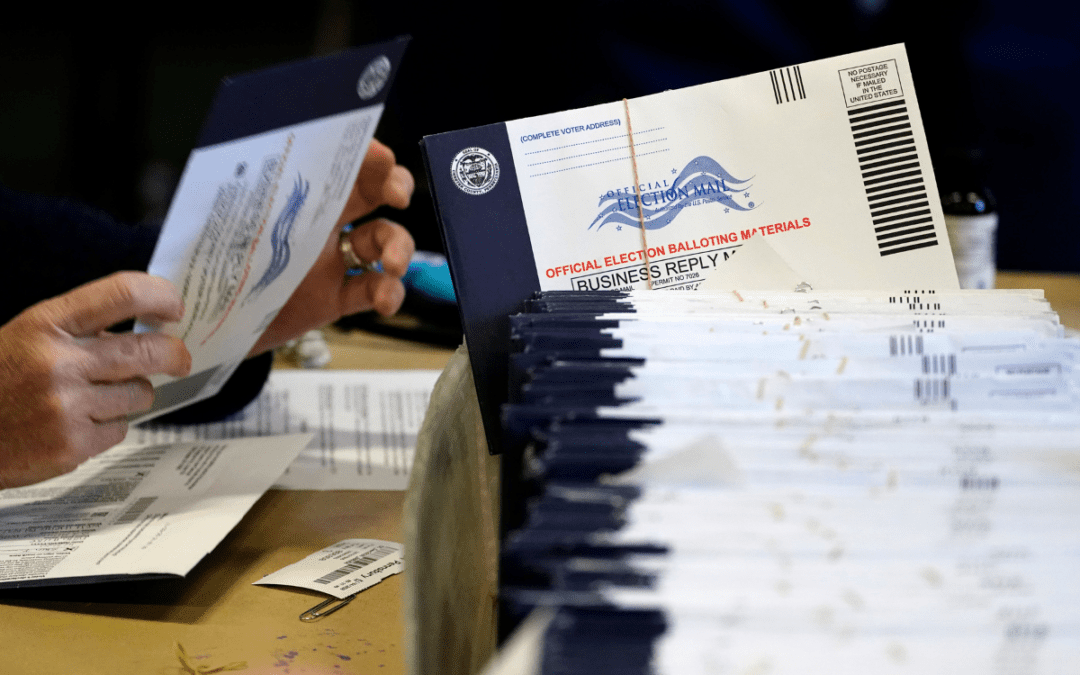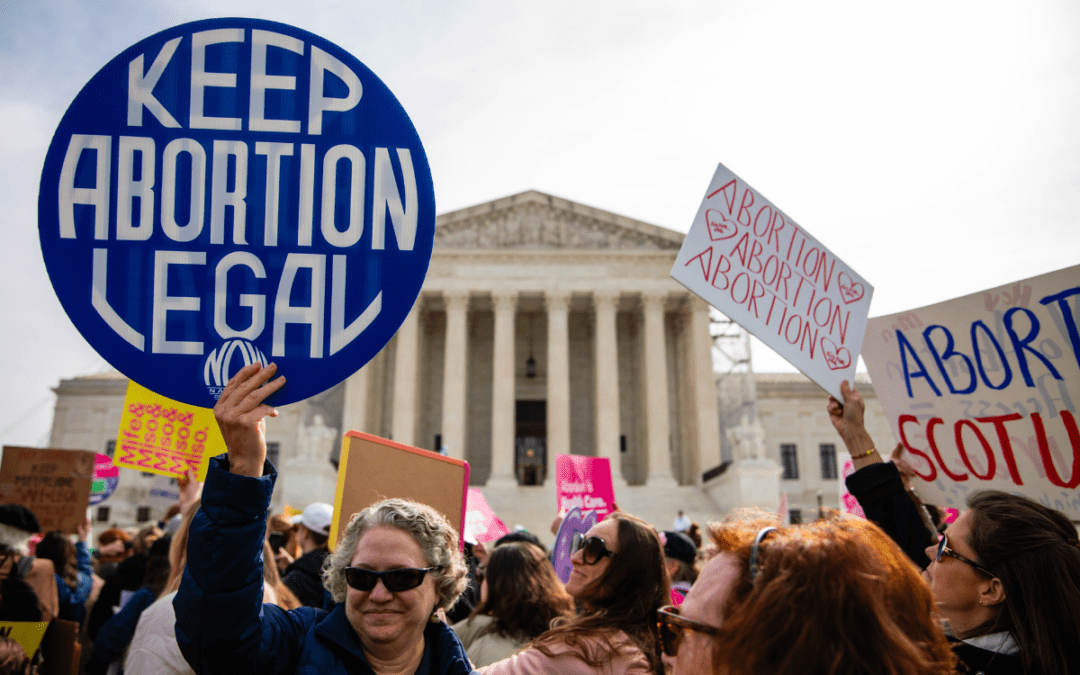
Kristen Eichamer holds a Project 2025 fan in the group's tent at the Iowa State Fair, Aug. 14, 2023, in Des Moines, Iowa. With more than a year to go before the 2024 election, a constellation of conservative organizations is preparing for a possible second White House term for Donald Trump. The Project 2025 effort is being led by the Heritage Foundation think tank. (AP Photo/Charlie Neibergall)
Does 1873 sound like a really, really long time ago? Well, that’s because it is—but if Republicans and far-right anti-abortion activists have their way, an 1870s law could soon be at play in the modern world as a tool to make abortion care all but impossible, even in states with legal protections for the procedure.
The law in question is called the Comstock Act. Its earliest iteration was passed in 1873 (yes, really) as a means of restricting distribution of “obscene” materials that would contribute to societal “vices.” The initial ruling made it illegal to distribute “lewd and lascivious” materials and anything intended to inform about or perform abortion via interstate mail systems.
A second law, passed in 1909 and combined with the earlier ruling under the heading of “the Comstock Act,” reinforced regulations. At the time, “lewd and lascivious” materials encompassed everything from letters describing unmarried courtships to medical textbooks with anatomical illustrations to information about contraception.
In recent decades, the law has been interpreted on a less literal basis, with federal courts allowing for transport of legal contraception and abortion materials by mail. But efforts to remove abortion-specific language from the original code have been unsuccessful.
Today, in the aftermath of the Dobbs decision that repealed Roe v. Wade, some anti-abortion groups like the Heritage Foundation—which is spearheading the ultra-conservative Project 2025—want the next administration to federally enforce the Comstock Act to effectively ban abortion by severely restricting providers’ ability to import and ship necessary materials, a move that would make safe abortion care nearly impossible nationwide.
That possibility has terrified abortion rights activists, who are sounding the alarms about a possible revival of the Comstock Act..
What’s at stake? Here are six potential outcomes if the Comstock Act were fully invoked to target abortion rights in the US:
Clinics and companies could be penalized for shipping abortion materials
Under a literal interpretation of the Comstock Act, “any drug, medicine, article or thing designed, adapted, or intended for producing abortion” cannot be legally transported through the mail or by any “common carrier.” Today, this would include shipping companies like FedEx or UPS.
If fully enforced, such restrictions would put both providers and shipping companies at risk of legal repercussions if they partook in the transport of medical equipment, medication, or other materials related to abortion–regardless of those materials’ intended use.
Medical tools used for abortions and other procedures could be inaccessible
“Intent” is an important word here. A literal interpretation of the Comstock Act would make it illegal to ship materials used for abortion, even if they have other medical intentions unrelated to abortion. This could include anything from medical gloves to speculums to medications used to treat other health conditions, in addition to their role in abortions (more on medications in a moment).
Intent is, of course, challenging to prove. Detailed elements of the Comstock Act would undoubtedly face legal scrutiny, and some have called its most extreme elements “unenforceable.” But anti-abortion advocates are already poised to push for its use.
Drugs used for abortions, like mifepristone, couldn’t be shipped
In the wake of expanded access to at-home abortion care, some anti-abortion activists and their legislative supporters have already invoked the Comstock Act to threaten pharmacies who provide customers with medication like mifepristone—one of two drugs used in medication abortions.
Mifepristone is available in states where abortion remains legal, but because some pharmacies ship this medication to patients through the mail or share supply with other pharmacies, defenders of the Comstock Act in its most literal form have argued that such distribution is illegal.
In fact, executives from CVS and Walgreens received a letter last year from 20 Republican state Attorneys General warning that their actions could be ruled illegal under Comstock.
What’s more, access to some abortion-related drugs like methotrexate could be at risk—despite the fact that these medications have other uses. Cleveland Clinic says methotrexate can be used to slow the growth of cancer cells, treat psoriasis, heal ulcers, and help with rheumatoid arthritis. Strict Comstock enforcement would make it challenging or impossible for non-abortion-seeking patients to receive some medications via mail simply because the drug in question is also used in some abortions.
Telehealth access would be limited—even for non-abortion patients
Similarly, access to abortion care through telehealth would be limited under a fully enforced Comstock Act.
In some states where abortion is illegal, telehealth allows patients to access care with providers, who can prescribe abortion medication which is then provided via mail. Should Comstock become the law of the land, telehealth would cease to be an option for patients seeking safe, discreet access to at-home abortion care–even in states where abortion remains legal.
Again, this might apply to medications used for abortion and treatment of other health conditions, further restricting access for patients with non-abortion needs.
Doctors would be limited in providing treatment for miscarriages
Medication used for abortion isn’t always distributed based on a pregnant person’s desire to terminate their pregnancy. In some cases, abortion-related drugs like mifepristone and misoprostol are used to help patients safely manage miscarriages and reduce the risk of complications.
The same can be said for equipment used to safely remove non-viable ectopic pregnancies, which can be fatal if not promptly treated. Should Comstock be invoked, clinics could lose access to medical equipment necessary for life-saving procedures following pregnancy complications.
Its five-year statute of limitations could retroactively punish abortion providers/pharmacies
Another alarming element of the Comstock Act is its five-year statute of limitations.
If enforced, the Act could lead to retroactive prosecution of anyone who had sent abortion-related materials or medication through the mail in the past five years.
If Trump were to resume office in early 2025 and heed the call of anti-abortion activists, providers, pharmacies, shipping companies, and educational organizations could face legal consequences for work they’re currently carrying out.
Politics

Fetterman introduces bill to protect affordable internet access for 23 million households
The Affordable Connectivity Program expired on Tuesday due to Republican opposition, putting affordable high-speed internet access at risk for 23...

Democrats advance election bill in Pennsylvania long sought by counties to process ballots faster
HARRISBURG, Pa. (AP) — Pennsylvania's House of Representatives on Wednesday approved a bill long sought by counties seeking help to manage huge...

Trump says he would allow red states to track pregnancies, prosecute abortion ban violators
In an interview published by Time magazine this week, former president Donald Trump detailed his plans for a potential second term and said he would...
Local News

Look out, Sheetz, Wawa is officially moving into your territory with Central Pa. expansion
The Delaware County-based convenience store chain broke ground on its first Dauphin County location Wednesday in Middletown, with five more stores...

What do you know about Wawa? 7 fun facts about Pennsylvania’s beloved convenience store
Wawa has 60 years of Pennsylvania roots, and today the commonwealth’s largest private company has more than 1,000 locations along the east coast....




